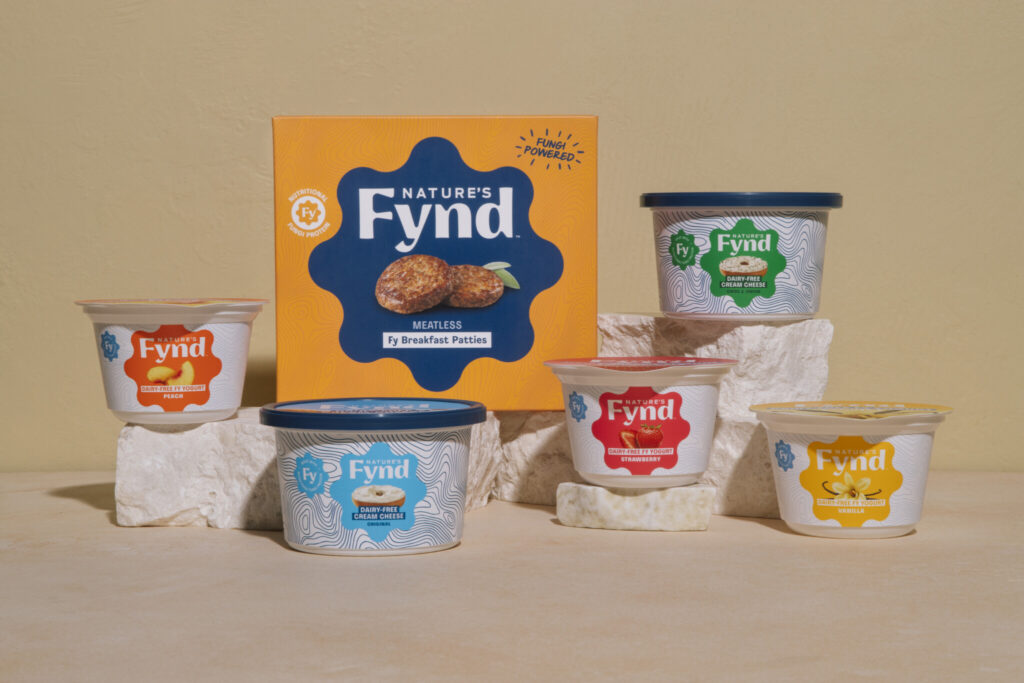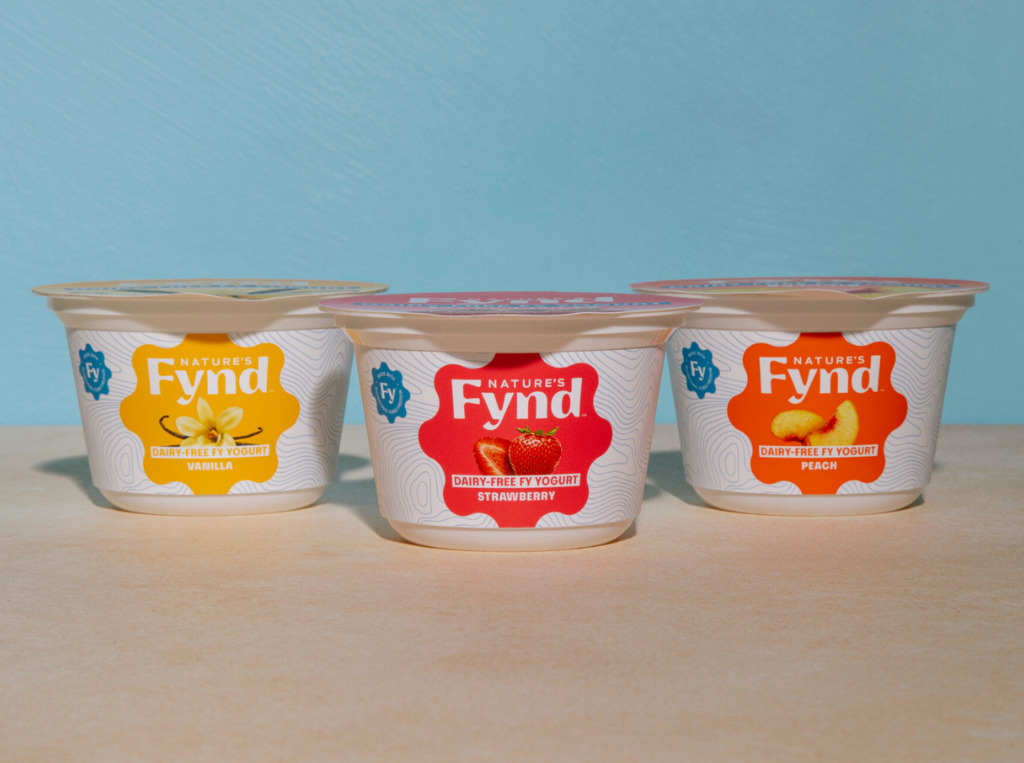Bill Gates-Backed Nature’s Fynd Says It’s Launching The World’s First Fungi Protein Yogurts at Whole Foods
5 Mins Read
Chicago-based food tech startup Nature’s Fynd will introduce what it claims are the “world’s first” fungi-based yogurts in January. Launching at Whole Foods stores across the US, this is the company’s third product line, and comes just as it was named in Inc. magazine’s 2023 Best in Business list.
Nature’s Fynd, the fermentation startup backed by the likes of Bill Gates, Jeff Bezos and Al Gore, has expanded its range of sustainable foods with three new yogurts made from its fungal protein Fy. The products add to its existing lineup of cream cheeses and meatless breakfast sausage patties, already available at Sprouts and Whole Foods.
“In a crowded market of dairy-free yogurts that often sacrifice nutrition for taste or vice-versa, we have created the world’s first fungi-based yogurt – it is delicious, nutrition-forward and earth-friendly,” said Nature’s Fynd co-founder and CEO Thomas Jonas. “We’re proud to deliver this first-to-market product with no tradeoffs—a delicious yogurt that is better for you and better for the planet.”
How Nature’s Fynd produces its Fy protein

The “thick and creamy” yogurts will be challenging established players like Kite Hill, Silk, So Delicious and Forager Project in a fluctuating market that has seen dollar sales grow of vegan yogurt grow by 5% from 2021-22, but unit sales decline by 5% too. Nature’s Fynd’s fungi-based varieties will be introduced at Whole Foods stores nationwide starting in January, and come in three flavours: vanilla, strawberry and peach.
Available in 5.3oz single-serve containers, they pack 8g of protein, 8-9g of total sugar and 4g of fibre, versus 6.6g of protein, 19g of sugar and zero fibre for a dairy-based non-fat fruit yoghurt. They make use of live cultures, boast essential amino acids and favourable digestion profiles, and are free from common allergens like soy, nuts or gluten.
The base ingredient, a milk alternative, is made from Fy protein. The ingredient is born out of research conducted for NASA on a fungal strain found in geysers at the Yellowstone National Park, called Fusarium strain flavolapis. The naturally occurring organism then undergoes biomass fermentation in a proprietary liquid-air interface,
“Our proprietary liquid air interface fermentation technology is a unique type of biomass fermentation where we grow biomass on top of a liquid surface rather than submerged in the liquid or on top of a solid,” Nature’s Fynd CMO Karuna Rawal told Green Queen last year.
Using trays in standing towers in a growth chamber, Nature’s Fund feeds the microbes a select blend of nutrients to kickstart high protein formation. Within a few days, filaments grow and begin interlacing, forming a mycelial ‘biomat’ with a texture similar to muscle fibres. This then undergoes simple food production steps – steaming, pressing, rinsing and slicing – to be harvested into its Fy ingredient, which can be turned into a liquid, solid or powdered state for use in animal-free foods.
The startup, which has raised over $500M in funding, says this process is highly efficient, and can even be performed in space – in fact, as long as there’s an aptly controlled environment, it can be carried out anywhere. To that end, it launched a bioreactor in the International Space Station Plus to test its protein’s zero-gravity capabilities. Plus, just one specimen isolated from a small sample of the filamentous fungi strain can create a virtually limitless supply of Fy.
There are massive environmental benefits attached too. Growing the mycelium-based ingredient requires roughly 99% less land than beef, with one acre producing 120 times more fungal protein than the latter. It also emits 94% fewer greenhouse gases and uses up 99% less water than beef, according to environmental performance modelled at scale by the company.
Chefs, awards and a trip to Europe?

The startup received FDA GRAS (Generally Recognized as Safe) approval for its Fy ingredient in June 2021, paving the way for fungal products to be introduced to the market. Prior to the yogurts, it released a line of dairy-free cream cheeses (in original and chive-and-onion flavours) and breakfast sausage patties, all of which were mixed with plant-based ingredients.
The announcement of the yogurts’ launch comes just as Nature’s Fynd was named in Inc. magazine’s 2023 Best in Business list in the Food & Beverage category. Inc. These awards recognise dynamic companies of all sizes that have outstanding influence and impact on their fields and society.
“Nature’s Fynd is answering the call to feed our growing population in the face of climate change, and we appreciate the recognition from Inc. for the positive contributions we’re striving to make in the world,” said Jonas. “Our vegan foods enable consumers to simply go to their local grocery store and choose delicious products that nourish them and nurture the planet.”
The company has partnered with chefs as well to demonstrate the credentials of its fungal protein products. In July, it teamed up with Le Bernardin co-owner Eric Ripert (also a culinary advisor to the brand) to create a trio of small-batch, limited-edition Fy salad dressings in Zesty Goddess, Miso Caesar and Herbed Ranch flavours. And last month, it collaborated with celebrity chef Andrew Zimmern, who has created some recipes with the Nature’s Fynd cream cheese for his online newsletter.
It’s a company thriving in a burgeoning $4B fungi protein market, which is expected to grow by 6% year-on-year through 2033. Additionally, there are at least 70 companies working with biomass fermentation, according to industry think tank the Good Food Institute. Within the mycelium world, a host of companies have ramped up their innovations lately, including Meati, Libre Foods and Prime Roots.
Nature’s Fynd has submitted a novel foods application for regulatory approval in the EU too – how do Europeans like their fungus?



